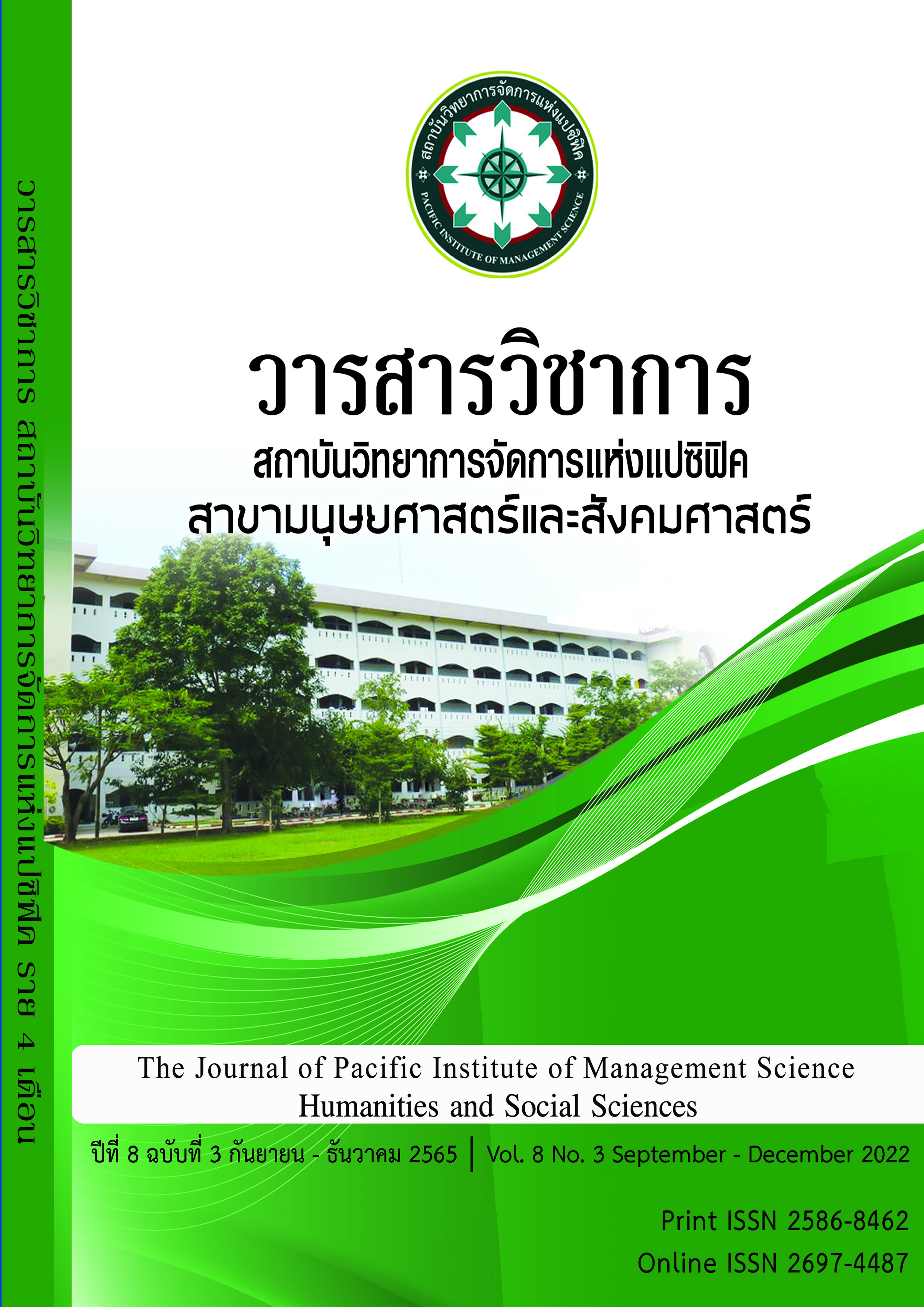The development of a professional learning community model in Learning management, Active Learning, Municipal School 1, Kalasin Pittayasit
Keywords:
Model development, A community of Professional learning, Active Learning ManagementAbstract
The development of a professional learning community model in management, Active Learning, Municipal School 1, Kalasin Pittayasit. The Objectives were: 1) to study the operational conditions of professional learning communities; in active learning management and the self-development needs of educational personnel in the operation of professional learning communities in Active Learning management, 2) to develop a professional learning community model in the management of Active Learning, Municipal School 1, Kalasin Pittayasit, 3) to experiment with the form of a professional learning community in the management of Active Learning, Municipal School 1, Kalasin Pittayasit Kalasin Municipality, 4) to find the effectiveness of the development of a professional learning community model in management Active Learning, Municipal School 1, Kalasin Pittayasit The sample group in the first phase was 52 teachers. Phase 2 consisted of 5 high-level experts. Phase 3 consisted of teachers and student representatives. Basic Education Board Student representative (parents of the network), a total of 84 people. Phase 4: personnel involved in educational management of Municipal School 1, Kalasin Pittayasit, amounting to 122 people.
The research results showed that:
1) The basic principles of professional learning community in Active Learning process management include three dimensions. It was a characteristic dimension or standard to evaluate the dimensions or steps of professional learning community in Active Learning management. And enhance the dimensions of the evaluation process. 2.) The results verify that the structural applicability of model 5 was consistent. In terms of applicability, feasibility, clarity and ease of use, the effectiveness were at the highest level. The experts had consistent opinions on all issues. The main elements and sub elements are the most suitable, and so were the opinions of experts. 3). An experimental model of a professional learning community in managing Active Learning, Municipal School 1, Kalasin Pittayasit. It was found that the personnel had knowledge and understanding about the professional learning community in active learning, learning management after development was higher than before development at statistical significance at .05 level. 4) The effectiveness of the development of a professional learning community model in Active Learning management was found that the development of student's creative ability in innovation as a whole had a development in learning management as a whole at the highest level
References
ฐาปณัฐ อุดมศรี. (2558). รูปแบบการบริหารโรงเรียนเพื่อเสริมสร้างชุมชนแห่งการเรียนรู้ทางวิชาชีพด้านการวิจัยปฏิบัติการในชั้นเรียน. วิทยานิพนธ์ปริญญาครุศาสตรดุษฎีบัณฑิต สาขาวิชาบริหารการศึกษา. กรุงเทพฯ: จุฬาลงกรณ์มหาวิทยาลัย.
ทวีศักดิ์ จินดานุรักษ์. (2561). ครูและนักเรียนในยุคการศึกษาไทย 4.0. วารสารอิเล็กทรอนิกส์การเรียนรู้ทางไกลเชิงนวัตกรรม, 7(2), 14-27.
นริศ ภูอาราม. (2560). การพัฒนาระบบการจัดการเรียนรู้โดยใช้ชุมชนแห่งการเรียนรู้ทางวิชาชีพ สำหรับเครือข่ายโรงเรียนประถมศึกษาขนาดเล็ก. วิทยานิพนธ์ปริญญาการศึกษาดุษฎีบัณฑิต สาขาวิชาการบริหารและพัฒนาการศึกษา. มหาสารคาม:บัณฑิตวิทยาลัย มหาวิทยาลัยมหาสารคาม.
ชาภัทร วิลเลี่ยมส์. (2559). การพัฒนาการนิเทศภายในโดยใช้กระบวนการสร้างชุมชนแห่งการเรียนรู้ทางวิชาชีพในโรงเรียนประถมศึกษา สังกัดสำนักงานคณะกรรมการการศึกษาขั้นพื้นฐาน. วิทยานิพนธ์ปริญญาการศึกษาดุษฎีบัณฑิต สาขาวิชาการบริหารการศึกษา. พิษณุโลก: บัณฑิตวิทยาลัย มหาวิทยาลัยนเรศวร.
บุญชอบ จันทาพูน. (2561). กลยุทธ์การเสริมสร้างชุมชนแห่งการเรียนรู้ทางวิชาชีพสำหรับครูโรงเรียนเทศบาล 1 ต้นยาง จังหวัดเชียงราย. วิทยานิพนธ์ปริญญาครุศาสตรดุษฎีบัณฑิต สาขาวิชาการบริหารการศึกษา. เชียงราย: มหาวิทยาลัยราชภัฏเชียงราย.
พสุธิดา ตันตราจิณ และธีระวัฒน์ จันทึก. (2559). การพัฒนาและการธำรงรักษาคนเก่งในองค์กรกลไกที่สำคัญในการขับเคลื่อนองค์กรสู่ความสำเร็จ. Veridian E-Journal, 9(1), 920-931.
พิมพร ใจงาม และพรชัย หนูแก้ว. (2557). การประเมินนักเรียนด้านการคิดวิเคราะห์ของผู้บริหารและครูโรงเรียนสังกัดสำนักงานเขตพื้นที่การศึกษาประถมศึกษา สุพรรณบุรี เขต 3 ตามแนวคิดการประเมินแบบเสริมพลัง. วารสารศิลปากรศึกษาศาสตร์วิจัย, 6(1): 273 – 284.
โรงเรียนเทศบาล 1 กาฬสินธุ์พิทยาสิทธิ์. (2562). รายงานผลการติดตามการจัดการเรียนรู้ของโรงเรียนเทศบาล 1 กาฬสินธุ์พิทยาสิทธิ์ ปีการศึกษา 2562. เอกสารอัดสำเนา.
ศิริชัย กาญจนวาสี. (2547). ทฤษฎีการประเมิน. กรุงเทพฯ : โรงพิมพ์แห่งจุฬาลงกรณ์มหาวิทยาลัย.
สาธิดา สกุลรัตนกุลชัย. (2554). การประเมินแบบเสริมพลังในการเรียนการสอนแบบสตูดิโอทางสถาปัตยกรรม. SDU Research Journal, 7(2): 143-151.
สุพรรณี ชาญประเสริฐ. (2557). Active Learning การจัดการเรียนรู้ในศตวรรษที่ 21. Retrieved from https://library.ipst.ac.th/browse
อนุสรา สุวรรณวงศ์. (2558). กลยุทธ์การบริหารเพื่อเสริมสร้างชุมชนแห่งการเรียนรู้ทางวิชาชีพ สำหรับครูโรงเรียนเอกชน. วิทยานิพนธ์ปริญญาครุศาสตรดุษฎีบัณฑิต สาขาวิชาบริหารการศึกษา. กรุงเทพฯ: จุฬาลงกรณ์มหาวิทยาลัย.
Battersby, S. L.; & Verdi, B. (2015). The Culture of Professional Learning Communities and Connections to Improve Teacher Efficacy and Support Student Learning. Arts Education Policy Review. 116(1): 22-29
Blanton, L. P., & Perez, Y. (2011). Exploring the relationship between special education teachers and professional learning communities: Implications of research for administrators. Journal of Special Education Leadership, 24(1), 6–16.
Boone, J. A. (2014). Information Management: An Educational Perspective. South African Journal of Library and Information Science. 58(4): 319-326.
David Mello. (2013). Effectiveness of active learning in the arts and sciences Department of Mathematics, and Department of Legal Studies. Rhode Island: Johnson & Wales University.
Dufour, R., Dufour, R., & Eaker, R. (2008). Revisiting professional learning communities at work: New insights for improving schools. Bloomington: Solution Tree Press.
Charalambous, Y. C., & Pitta-Pantazi, D. (2016). Perspectives on Priority Mathematics Education: Unpacking and Understanding a Complex Relationship Linking Teacher Knowledge, Teaching, and Learning. In: L. D. English & D. Kirshner (Eds.). Handbook of international research in mathematics education, 19-59.
Christine, S. (2010). Taking active learning into the primary school: a matter of new practices? Retrieved from. https://www.tandfonline.com/author/Stephen%2C+Christine
Elbousty, M. Y., & Bratt, K. (2010). Continuous inquiry meets continued critique: The professional learning community in practice and the resistance of (un)willing participants. Retrieved from http://files.eric.ed.gov/fulltext/ED510036.pdf
Fetterman. (1994). Empowerment Evaluation. Evaluation Practice, 15(1) : 1–15.
Hairon, Salleh; Goh, Jonathan Wee Pin; Chua, Kheng Catherine Siew; & Wang, Li-Yi. (2017). A Research Agenda for Professional Learning Communities: Moving Forward. Professional Development in Education. 43(1): 72-86.
Downloads
Published
Issue
Section
License
Copyright (c) 2022 Pacific Institute of Management Science

This work is licensed under a Creative Commons Attribution-NonCommercial-NoDerivatives 4.0 International License.
บทความที่ได้รับการตีพิมพ์เป็นลิขสิทธิ์ของ สถาบันวิทยาการจัดการแห่งแปซิฟิค
ข้อความที่ปรากฏในบทความแต่ละเรื่องในวารสารวิชาการเล่มนี้เป็นความคิดเห็นส่วนตัวของผู้เขียนแต่ละท่านไม่เกี่ยวข้องกับสถาบันวิทยาการจัดการแห่งแปซิฟิค และคณาจารย์ท่านอื่นๆในสถาบันฯ แต่อย่างใด ความรับผิดชอบองค์ประกอบทั้งหมดของบทความแต่ละเรื่องเป็นของผู้เขียนแต่ละท่าน หากมีความผิดพลาดใดๆ ผู้เขียนแต่ละท่านจะรับผิดชอบบทความของตนเองแต่ผู้เดียว







